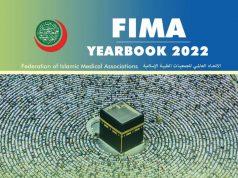Dear FIMA members
Assalamu Alaykum
Bismillah al-Rahman al-Rahim
All praises be to Allah (جل جلاله (the Most Beneficent, Most Merciful.
Peace and blessings be upon Prophet Muhammad (صلى الله عليه وسلم ,(his family, companions and
followers until the end of time.
The cardinal purposes of the Muslim’s individual, community and global life experiences
have been comprehensively defined by maqassid al-shari`ah, the highest objectives of
Islamic jurisprudence. The wellbeing and welfare of the community is protected by the
preservation of the five essentials (daruriyyat) in human life, namely faith and morality
(din), life (nafs), intellect (‘aql), progeny (nasl) and wealth (mal)
1
.
In the hierarchy of maqassid al-shari`ah, the sanctity of human life is prioritized,
second only to the preservation of din. Life is a divine gift and trust from Allah (جل جلاله (and
its protection and continuation is of utmost urgency and importance.
“And if anyone saved one life, it would be as if he had saved mankind entirely”2
.
Allah, the Life Giver (al-Muhyi) is also the Life Taker (al-Mumit).
“He gives life and causes death (yuhyi wayumit), and to Him you will be returned” 3
.
The following prayer taught by the Prophet (صلى الله عليه وسلم (reiterates the fact that only
Allah (جل جلاله (decides and determines the timing of life and death:
“O Lord! Please let me live if that is for my good and please let me die if that is better
for me”4
.
Death marks the departure from the continuum of temporal life here on earth and a
journeying towards eternal life in the hereafter. We are exhorted to invest our life
righteously so as to enjoy the fruits in the life hereafter. We are regularly reminded to
prepare for the afterlife, and central to this exhortation is the constant preparedness
for death.
Life and death issues became more pronounced and complicated with end of life care and
the myriad of clinical choices available. Advances in medicine and surgery have
revolutionized the care of patients with cancer, cardiac disease and others with major
organ failures. There has been improvements in the morbidity and mortality rates of the
critical and terminal patient, however with variable and questionable betterment of
their quality of life. The power of the science of healing has somewhat overwhelmed the
art of healing and has unwittingly unleashed new sets of clinical, ethical, legal, cultural
and religious issues which now challenge our objectives and ethics of end of life care.











